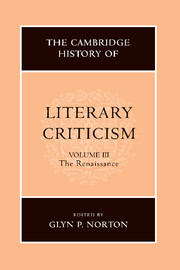Book contents
- Frontmatter
- Introduction
- READING AND INTERPRETATION: AN EMERGING DISCOURSE OF POETICS
- POETICS
- I Humanist classifications
- II The rediscovery and transmission of materials
- III Rhetorical poetics
- IV Literary forms
- 20 Italian epic theory
- 21 The lyric
- 22 Renaissance theatre and the theory of tragedy
- 23 Elizabethan theatrical genres and literary theory
- 24 Defining comedy in the seventeenth century: moral sense and theatrical sensibility
- 25 Dialogue and discussion in the Renaissance
- 26 The essay as criticism
- 27 The genres of epigram and emblem
- 28 Humour and satire in the Renaissance
- THEORIES OF PROSE FICTION
- CONTEXTS OF CRITICISM: METROPOLITAN CULTURE AND SOCIO-LITERARY ENVIRONMENTS
- VOICES OF DISSENT
- STRUCTURES OF THOUGHT
- NEOCLASSICAL ISSUES: BEAUTY, JUDGEMENT, PERSUASION, POLEMICS
- A SURVEY OF NATIONAL DEVELOPMENTS
- Bibliography
- Index
- References
20 - Italian epic theory
from IV - Literary forms
Published online by Cambridge University Press: 28 March 2008
- Frontmatter
- Introduction
- READING AND INTERPRETATION: AN EMERGING DISCOURSE OF POETICS
- POETICS
- I Humanist classifications
- II The rediscovery and transmission of materials
- III Rhetorical poetics
- IV Literary forms
- 20 Italian epic theory
- 21 The lyric
- 22 Renaissance theatre and the theory of tragedy
- 23 Elizabethan theatrical genres and literary theory
- 24 Defining comedy in the seventeenth century: moral sense and theatrical sensibility
- 25 Dialogue and discussion in the Renaissance
- 26 The essay as criticism
- 27 The genres of epigram and emblem
- 28 Humour and satire in the Renaissance
- THEORIES OF PROSE FICTION
- CONTEXTS OF CRITICISM: METROPOLITAN CULTURE AND SOCIO-LITERARY ENVIRONMENTS
- VOICES OF DISSENT
- STRUCTURES OF THOUGHT
- NEOCLASSICAL ISSUES: BEAUTY, JUDGEMENT, PERSUASION, POLEMICS
- A SURVEY OF NATIONAL DEVELOPMENTS
- Bibliography
- Index
- References
Summary
The surge of Italian theorizing about epic that began in the mid-sixteenth century was part of a general effort to systematize poetic discourse by classifying and defining it according to its various genres. Aristotle's Poetics acquired unprecedented value in the second half of the sixteenth century precisely because its method and orientation suited the need to define poetry in terms of its genres and of their differences. The Greek text was made to spawn a much more systematic theory of genres than Aristotle had intended. Late Cinquecento theorization of comedy makes this amplification of the Poetics particularly apparent since Aristotle left no substantive definition of comedy, or if he did, as was promised at the beginning of Chapter 6, it was subsequently lost. The lacking discussion of comedy did not prevent commentators from erecting what they imagined would be an Aristotelian theory of comedy. Indeed, it encouraged such projections, beginning with Francesco Robortello's ‘Explicatio’ on the art of comedy appended to his commentary on the Poetics (1548), and Giovan Giorgio Trissino's discussion of comedy in the Sesta divisione della Poetica (composed c. 1549) which follows what is, for the most part, an Italian paraphrase of Aristotle's Poetics. Eventually these reconstructions become independent attempts to codify comedy, for example Antonio Riccoboni's De re comica (1579). What was proclaimed to be Aristotle's codification of epic was, in a similar way, what sixteenthcentury interpreters projected on the basis of Aristotle's brief discussion. Whereas Aristotle said next to nothing about comedy, he did devote two brief chapters (23 and 24) of the Poetics to epic, but without considering epic's distinctive attributes in any detail.
- Type
- Chapter
- Information
- The Cambridge History of Literary Criticism , pp. 205 - 215Publisher: Cambridge University PressPrint publication year: 1999
References
- 3
- Cited by



